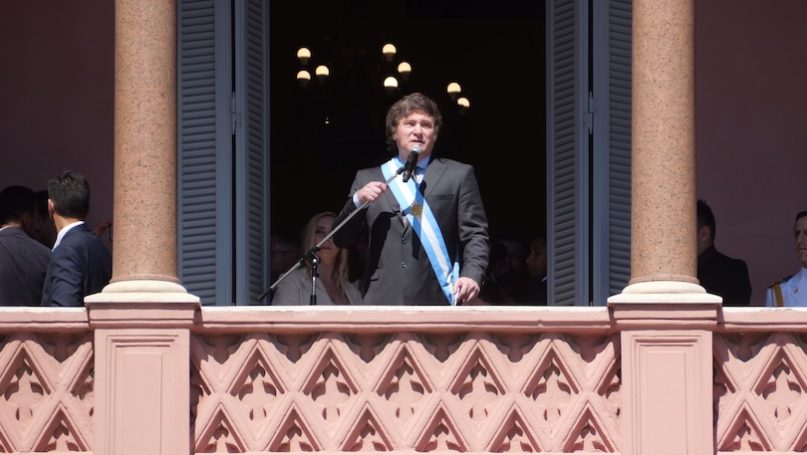
Argentina is about to enter not just the start of a new presidency, but a paradigm shift in how citizens conceive their relationship with the State. Since the restoration of democracy in 1983, Argentina’s social contract has deepened the trajectory set in motion by Juan Domingo Peron in the 1940s, encapsulated succinctly by Eva Peron’s memorable assertion: “Where a need exists, a right is born.” Various banners, from “The Present State” to “A State for Everyone” and “The Answer is more State,” have all shared a fundamental premise – the onus on the nation-state is to provide as comprehensively as possible for its citizens. While theoretically and discursively appealing, politicians adhering to Peronist ideas invariably stopped short of explaining how they would apply and fund them into action.
Over the past two decades, under the stewardship of Peronism’s latest incarnation, the Kirchners, the concepts of “free” and “universal” have become synonymous with expansive social programs. These spanned from uncontroversial domains such as healthcare and education to more unconventional areas like soccer broadcasting and national cumbia recitals. Naturally, while free to users and beneficiaries, someone must always pay. Because the state does not produce wealth and is primarily funded through taxation, that someone is taxpayers. And, it has been taxpayers indeed who have borne the burden of financing Argentina’s relentless expansion.
The unchecked growth in non-financial public spending has been staggering, surging from 24.7% of GDP in 1983 to 42.8% in 2022. Astonishingly, Argentina’s GDP per capita in 2022 (measured at constant 1980 USD $3860) is nearly identical to that of 1979 (1980 constant USD $13,810). This aligns with extensive research illustrating an inverse U-shaped relationship between government size and citizens’ well-being. Consequently, this fiscal trajectory has translated into a surge in tax revenue, with Argentina now boasting the second-highest tax rate in Latin America
Citizen expectations of a state that guarantees services are free and universal (yet not necessarily efficient, accessible, or reliable) marks an era in Argentina where politicians touted the virtues and promoted the construction of an omnipresent state. Fiscal considerations became an afterthought and conversations on spending and financing never seemed to reach the public realm. Lack of transparency and visibility on spending combined with a frenzy for money printing, which ended up crippling the economy with soaring inflation, precluded Argentines from ever understanding the impacts of relentless spending.
However, Argentina now stands at a pivotal juncture. The nation’s first self-proclaimed Libertarian president, Javier Milei, has assumed office, armed with an audacious fiscal austerity program that he has openly declared will entail short-term hardships. Milei’s rallying cry, “No hay Plata” (“There is no money”), belies his ambitious plan to deviate sharply from the enduring Peronist doctrine of extensive government intervention, nationalization of private enterprises, and consolidation of the welfare state. Instead, he promises to heavily shrink the organizational structure of the executive branch, privatizing state-owned enterprises, and progressively phase out government subsidies in sectors like energy and transportation, inevitably leading to increased costs for consumers.
Paradoxically, Milei’s plans have garnered widespread support, with 56% of voters and the majority of the press endorsing his vision. Why this remarkable consensus? Firstly, Argentina finds itself in dire economic straits, necessitating unconventional measures. While other candidates advocated for continuity of the status quo or evaded discussions about how to address the colossal fiscal deficit that birthed a projected 200% inflation rate, Milei’s “shock” program offers a radically different and economically orthodox alternative, albeit one fraught with short-term pain.
Secondly, the once-enduring notion of an all-encompassing state no longer resonates with Argentines, who perceive the government as an expensive, inefficient, and bureaucratic apparatus that espouses appealing ideals but fails to deliver on essentials like currency stability, employment, security, and affordable housing.
Lastly, the nation’s exposure to rampant corruption scandals has eroded faith in a government that is not merely inefficient but actively siphons resources from an already impoverished populace. Milei, frequently invoking the ideas of Friedrich Hayek and Milton Friedman, has breathed new life into 20th-century libertarianism, offering Argentines a much-needed escape into the realm of individual freedom, away from the clutches of an overbearing government.
The seismic shift in the social contract engineered by this administration, coupled with the unprecedented electoral support it has garnered – representing the highest vote percentage since the resurgence of democracy – is a development of profound consequence. Argentina, akin to its historical precedents with state modernism in the 1880s and the advent of the welfare state in the 1940s, now stands as a crucible, once more inviting the world to witness a pivotal experiment: Can libertarianism serve as the lifeline for a nation grappling with the depths of economic catastrophe?
Further Reading on E-International Relations
- Opinion – Argentina’s Pivotal Decision
- Opinion – Argentinian President Alberto Fernandez’s Diplomatic Mishap Amidst Crisis
- COVID-19 and the Economic Crisis in Argentina
- The Compliance of Argentina’s Migration Law with Human Rights Discourse and Principles
- How Do States Behave? A Comparative Analysis between China and Argentina
- Perspectives on the Newly Elected Fernández’s Foreign Policy